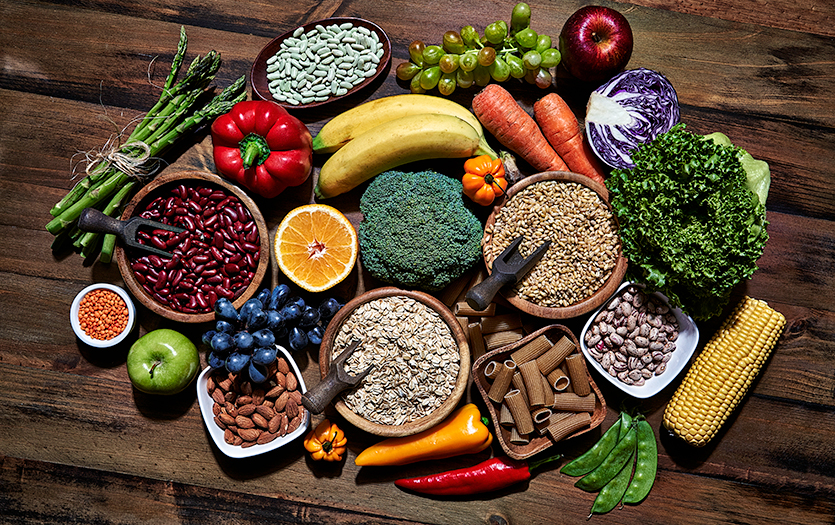
This post was written based on a presentation by Lydia Hall, RDN, LD, community outreach dietitian, Parkview Center for Healthy Living.
Heart disease is the leading cause of death for men, women and people of most racial and ethnic groups in the United States. While some risk factors, like genetics, are nonmodifiable, you can make changes to increase your chances for a healthy, heart-happy life.
Instances of heart disease
Sadly, the current statistics on heart disease in our country are staggering.
- About 695,000 people in the U.S. died from heart disease in 2021—that’s one in every five deaths.
- Nearly half of adults in the U.S. have hypertension, which puts them at risk for heart disease and stroke.
- Coronary heart disease is the most common type of heart disease, killing 375,476 people in 2021.
- In the U.S., someone has a heart attack every 40 seconds.
Heart disease is an umbrella term for several heart conditions, including coronary artery disease, which is the most common. These diagnoses can decrease blood flow, which can cause heart attacks. Blockages can lead to strokes. High blood pressure makes our heart, lungs and kidneys work extra hard. In short, trouble with the heart can mean trouble throughout the body’s systems.
The good news
It’s believed that as much as 80% of cardiovascular disease is preventable through:
- Healthy eating
- Physical activity
- Avoiding tobacco and alcohol
- “Knowing your numbers”.
- Blood pressure, cholesterol and blood sugar
- Stress reduction
A focus on food
Heart disease is often treated with medication and surgery, but poor nutrition is the leading cause of heart disease. So, it stands to reason that by improving your dietary habits, you might be able to avoid the need for these interventions.
In this post, we’ll focus on the benefits of:
- Reducing sodium
- Reducing saturated fat
- Reducing sugar
- Increasing fiber
- Hydration
- Fruits and vegetables
Reducing sodium for heart health
Consuming packaged foods, highly processed foods and dining out typically equates to a high sodium intake. Why is this a bad thing? Excessive sodium causes fluid retention and increases blood volume and pressure.
The goal is to limit daily sodium to less than 2,300 mg and less than 1,500 mg if you have hypertension.
Be mindful of the sodium content in:
- Restaurants/fast food
- Canned foods
- Pre-packaged foods
- Marinades and sauces
- Deli meats and cheeses
- Seasoning packets
These strategies can help reduce your salt intake:
- Limit eating out and cook more frequently at home.
- Drain and rinse canned beans/vegetables and/or choose no-salt/reduced-sodium options.
- Flavor foods with fresh herbs and spices and taste food before adding salt.
- Look at the nutrition label and limit foods that have higher than 5% DV sodium per serving.

Lowering saturated fat intake for heart health
High dietary saturated/trans fat increases the production of cholesterol in the liver. Higher blood cholesterol leads to a buildup of arterial plaque. This contributes to clogging and constriction of the arteries, which makes it harder for the heart to pump blood throughout the body.
The 2020-2025 Dietary Guidelines for Americans recommends that saturated fat should make up less than 10% of your calories daily.
We find high amounts of saturated fat in:
- Animal products such as meat and dairy
- Packaged snacks
- Fried foods
- Candy
To hit the recommended amount of saturated fat:
- Choose low-fat dairy products.
- Snack on fresh fruits and vegetables.
- Opt for leaner meats, like poultry without skin, fish, beans, legumes, nuts and seeds.
- Limit beef and pork and select leaner cuts and grinds when purchasing.
- Cook food in unsaturated fats (olive oil, canola/vegetable oil, etc.). You can also try vegetable broth or water in your preparations in replace of fats.
- Grill, bake, boil or sauté food instead of frying.
- Consider making a few plant-based meals weekly.
Avoiding added sugar for heart health
When we have excessive amounts of sugar, it can lead to insulin resistance, which can result in a Type 2 diabetes diagnosis. Uncontrolled blood sugar can damage all parts of the cardiovascular system, the nerves, the kidneys, and more.
Added sugar should make up less than 10% of your daily calories.
The most common sources of sugar are:
- Candy
- Desserts
- Sugar-sweetened beverages
- Pre-packaged snacks
- Bread and baked goods
- Cereal
To avoid overdoing it with the sweet stuff:
- Drink mostly water
- Limit sugar-sweetened drinks
- Create balanced meals and snacks that contain protein, fiber and carbohydrates from sources like fruits, starchy vegetables and whole grains
Increasing fiber for heart health
Soluble fiber is shown to help lower cholesterol, while low fiber can cause constipation, high cholesterol and higher blood sugar.
The goal is to consume around 25-30 g of fiber daily.
The best sources of fiber are:
- Non-starchy vegetables
- Fruits
- Whole grains
There is no fiber in meat or dairy, and very little in most processed grains and foods.
To hit your fiber goal:
- Fill half of your plate with fruits and veggies.
- Make at least half of your grains whole grains.
- Vary your protein to include more plant-based options.
Hydration for heart health
Drinking enough water, especially during the warm months, can reduce the body’s need for holding onto extra water.
A good goal is to consume half of your body weight in pounds in ounces daily. This varies with activity. (i.e. a 140-pound person should drink 70 ounces of water.)
Fruits and vegetables for heart health
Only 1/10 people in the U.S. meet the recommendation for daily fruits and vegetables. Consuming 2 cups of fruit and 3 cups of vegetables a day provides potassium, which relaxes blood vessels. This helps to lower blood pressure, in contrast to sodium, which raises it. They also offer cholesterol-lowering benefits. Produce provides vitamins, minerals and antioxidants.
With these tips in mind, the Dietary Approaches to Stop Hypertension (DASH) diet can offer more parameters for heart-healthy eating. The approach emphasizes fruits, vegetables, whole grains and lean proteins. You can read more about these guidelines here. This post on the benefits of whole-food plant-based eating is another great reference.
Bonus points
In addition to rethinking your approach to nutrition, these lifestyle shifts can help reduce your risk of heart disease:
- Exercise a little every day. Movement can improve blood flow and strengthen your heart. Simply going for a walk can do a lot of good for the body.
- Not smoking. Smoking damages your blood vessels.
- Healthy stress management. Address stress and anxiety through joyful movement, prayer or meditation, breathwork, visualization, counseling or connecting with a loved one.
- Get plenty of sleep.
- Avoid alcohol and caffeine.
- “Know your numbers”. Have your blood pressure, cholesterol and blood sugar checked regularly.
For more resources on heart health, visit the patient resources section under “Heart Health” on parkview.com.



